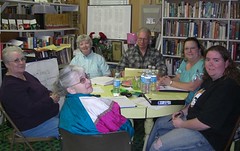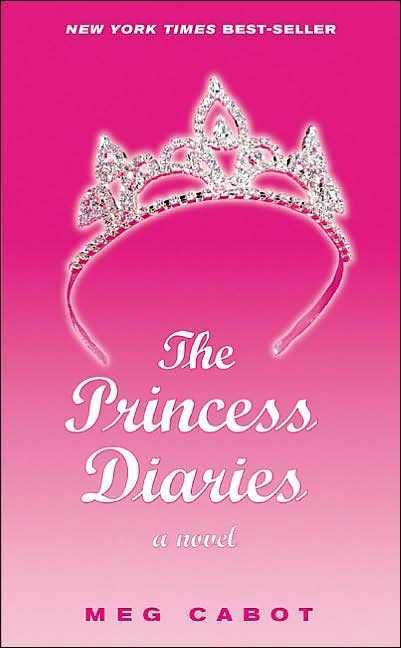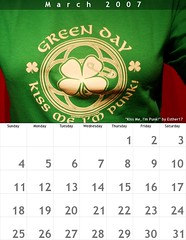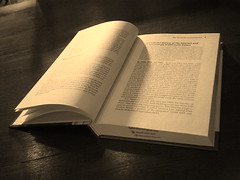You've probably already guessed this based on the topic of my blog, but I thought you all should know that I am unquestionably and irreversably addicted to words. I love to find new and interesting words in the books or websites I read, I own more than one word-a-day calendar, and once I discover them, I use new words. A lot.
Now, you might be asking yourselves, what does your word-addiction have to do with anything novel-writing-related, Jacey? The answer is simple: Disambiguation.
It's day four of my Spring Break, also known as the "You're not in a tropical vacation destination, there's snow outside, you're home alone, you might as well be productive" Day. So here I sit at the kitchen counter wondering where to start, and because staring at my computer screen and rocking out to
Kevin Hammond aren't getting me anywhere, I decide to take a look at the deadlines I drew up at the start of my project. Now after a somewhat discombobulated introduction we are finally arriving at the point of this post: The deadlines I set for myself so many months ago are looking...well, let's just say I must have had myself confused with Wonder Woman when I wrote them. According to my little timeline I am two weeks and four chapters behind schedule, not to mention the ten other tasks I am supposed to have done before break is over. A little discouraging, no?
Well after the initial mental headslap, I decided my situation isn't all that bad. Even though I'm not exactly on schedule, I have continuously made progress, no matter how little, since the day I started the project. I still have a functional list of what needs to be done (even though the dates are now a little off). This little timeline descrepency has given me a reason to sit back, re-evaluate my progress, and create a new (and hopefully more accurate) time-table.
Ultimately, that last one turned out to be really helpful. This morning I was at a loss for what to do, where to go, how to move forward, etc... Now, just three short hours later I have a new calendar and a renewed excitement. These new goals I have set are actually realistic, which is definitely an upper, and even with adding a little more time for each task I am still pretty good as far as total time goes.
Anyway, the lesson I learned today and wanted to share isn't really complex, but I think it could be helpful:
1. Deadlines are sneaky little devils. I set goals for myself several months ago before I had even started writing, and more importantly, even before I had considered that my life would involve other objectives besides writing. I didn't think to consider that I might get smacked in the face with the flu the week before midterms, let-alone acknowledge that I might need to study for those pesky exams. So somewhere between preparing for advising meetings and getting the oil changed in my car those sneaky little deadlines slipped away.
2. Because of my tendency to overestimate my own capabilities I learned a little something about the nature of deadlines. If there aren't consequences for not meeting them, they lose a little of their luster. To combat this, I have decided to look at my "deadlines" as more of a "disambiguation chart," hence the little intro to word-addiction at the beginning of the post. Disambiguation basically means to remove ambiguities, and my calendar of tasks will help me to navigate the rest of my project in the same way that a road-map would help to disambiguate a tricky roadtrip.
Overall, I will really try to stick to the new deadlines I have set for myself but, like before, if I should happen to fail, at least it provides a record of what needs to be done so I am never permanently discouraged.
 Image via Wikipedia I'm happy to announce that as of July 29th, 2010 I have officially completed my first novel! Utilizing the research and guidelines I outlined on this blog, I was actually able to plan and complete writing a book that I am really proud of.Now, a new phase of this journey has begun, and I am learning the next steps right along with you.
Image via Wikipedia I'm happy to announce that as of July 29th, 2010 I have officially completed my first novel! Utilizing the research and guidelines I outlined on this blog, I was actually able to plan and complete writing a book that I am really proud of.Now, a new phase of this journey has begun, and I am learning the next steps right along with you.

![Reblog this post [with Zemanta]](http://img.zemanta.com/reblog_e.png?x-id=c89e46a2-8f1d-442e-9a93-24b8281e3d35)

![Reblog this post [with Zemanta]](http://img.zemanta.com/reblog_e.png?x-id=0621c12d-c75a-4e7f-abda-94238c6acfbb)

![Reblog this post [with Zemanta]](http://img.zemanta.com/reblog_e.png?x-id=95f028f0-c722-4a77-8676-ab3a6de976f0)
![Reblog this post [with Zemanta]](http://img.zemanta.com/reblog_e.png?x-id=a616d597-673e-4d6a-b5e6-7049228c487e)
![184] The Great Gatsby – F. Scott Fitzgerald « A Guy's Moleskine ...](http://images.google.com/images?q=tbn:xcSb7PhNi7Ms1M:mattviews.files.wordpress.com/2009/02/gatsby1.jpg)
![Reblog this post [with Zemanta]](http://img.zemanta.com/reblog_e.png?x-id=55731b63-20fe-4a5b-85e1-e287a7c4473a)

![Reblog this post [with Zemanta]](http://img.zemanta.com/reblog_e.png?x-id=731cffa1-c13d-4b0f-ae83-7b3258477a2e)

![Reblog this post [with Zemanta]](http://img.zemanta.com/reblog_e.png?x-id=1c8fe176-0e2f-4051-a9f7-68a12b383a9c)



 ShareThis
ShareThis